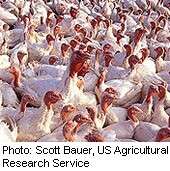Ground turkey from retail stores is often contaminated with fecal bacteria, and in many cases the bacteria are resistant to antibiotics, according to a report published in the June issue of Consumer Reports.
(HealthDay)—Ground turkey from retail stores is often contaminated with fecal bacteria, and in many cases the bacteria are resistant to antibiotics, according to a report published in the June issue of Consumer Reports.
Researchers conducted a laboratory-based analysis of 257 samples of ground turkey bought at retail stores nationwide to examine the level of bacterial contamination for Enterococcus, Escherichia coli, Staphylococcus aureus, Salmonella, and Campylobacter.
The researchers found that more than half of the packages of raw meat and patties tested positive for fecal bacteria, and 90 percent of samples were contaminated with one of the five bacteria. Almost all the bacteria were resistant to one or more antibiotics. The levels of contamination in the ground turkey samples were 69 percent for Enterococcus, 60 percent for E. coli, 15 percent for S. aureus and 5 percent for Salmonella. About 80 percent of the Enterococcus and more than 50 percent of E. coli were resistant to three or more classes of antibiotics. Three samples were found to contain methicillin-resistant S. aureus. There was no difference in the level of bacterial contamination in samples labeled "no antibiotics," "organic," or "raised without antibiotics," compared with samples without these labels; however, bacteria from samples with these labels were less likely to be resistant to antibiotics.
"Our findings strongly suggest that there is a direct relationship between the routine use of antibiotics in animal production and increased antibiotic resistance in bacteria on ground turkey. It's very concerning that antibiotics fed to turkeys are creating resistance to antibiotics used in human medicine," Urvashi Rangan, Ph.D., director of the food safety and sustainability group at Consumer Reports, said in a news release. "Humans don't consume antibiotics every day to prevent disease and neither should healthy animals."
More information: More Information
Health News Copyright © 2013 HealthDay. All rights reserved.




















